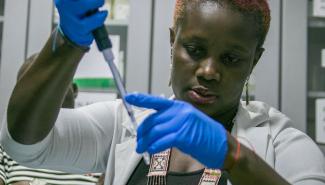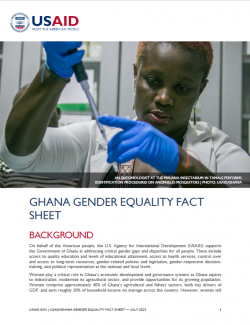BACKGROUND
On behalf of the American people, the U.S. Agency for International Development (USAID) supports the Government of Ghana in addressing critical gender gaps and disparities for all people. These include access to quality education and levels of educational attainment, access to health services, control over and access to long-term resources, gender-related policies and legislation, gender-responsive decision-making, and political representation at the national and local levels.
Women play a critical role in Ghana’s economic development and governance systems as Ghana aspires to industrialize, modernize its agricultural sector, and provide opportunities for its growing population.
Women comprise approximately 40% of Ghana’s agricultural and fishery sectors, both key drivers of GDP, and earn roughly 30% of household income on average across the country. However, women still face large profit gaps, reduced opportunities for economic growth, and limited access to credit and capital. Harmful social norms affect vulnerable groups, including women and girls, who face gender-based violence (GBV), child marriage and early pregnancy, and disproportionate household responsibilities.
GOALS AND KEY ACHIEVEMENTS
GOAL 1: ELIMINATE GENDER-BASED VIOLENCE AND MITIGATE ITS HARMFUL EFFECTS
Gender-based violence is a violent manifestation of structural gender inequalities that adversely affect women, youth, LGBTQIA+ groups, community security, and public health. USAID supports efforts to build the capacity of community-based survivor-led organizations, and encourages traditional, local, and faith-based leaders to serve as gender champions to advocate for improved health practices among families.
Key achievements:
- In the Volta Region of Ghana, USAID collaborated with the Ministry of Fisheries, local government officials, and community leaders to host a Durbar, a ceremonial event where traditional leaders meet with constituents, to commemorate 16 Days of Activism Against Gender-Based Violence, a global campaign that seeks to end violence against women and girls. Over 400 community folks participated in a procession to raise awareness of GBV.
GOAL 2: ESTABLISH EQUITABLE NORMS FOR WOMEN AND GIRLS
Harmful social norms present one of the biggest challenges to women’s access to and agency over credit, capital, and other financial resources. USAID prioritizes working with community leaders and key stakeholders to understand how to instigate positive social and behavioral change. USAID’s practical approach to inclusive development means working with communities to meet the distinct needs of people of all genders (e.g., making meeting times and locations more accessible, setting targets for women’s participation in school management committees, and providing transport or childcare, as appropriate) and using strategic, gender-sensitive measures that ease accessibility to USAID’s assistance (e.g., flexible teacher certification training to accommodate female teachers in remote regions of northern Ghana and specialized, affordable financing instruments for women-owned low-cost private schools).
Key achievements:
- The USAID West Africa Trade & Investment Hub worked with several large apparel companies to promote women’s equity and empowerment as a strategy that contributes to business profitability and growth. These three businesses currently employ more than 5,000 women, and by offering fair pay and quality benefits, are establishing Ghana as a new node for global ethically sourced apparel. Since 2020, the project has created 15,000 jobs, facilitated $60M in exports, and achieved a 72% participation rate for women across project interventions.
- USAID’s Partnership for Education Learning Activity benefited 991,317 girls in primary school (48% of total targeted learners) and 133,622 girls in pre-primary school (49% of targeted learners) since FY2021, improving reading comprehension and fluency skills of learners in KG2 (Kindergarten) to grade 4. The activity also strengthened in-service training for English reading instruction for teachers, reaching a total of 12,775 women (63% of teachers targeted).

USAID/GHANA

